Share

Invisible Not Broken - Chronic Illness Podcast Network
Travel and Disability: Tips, Tricks, for Roadtrips, Planes, and Family Reunions When You Have A Chronic Illness
Sign up with your email address to receive news and updates.
Email Address Sign UpWe respect your privacy.
Thank you!Before you travel
Make sure you have more than enough meds to get you through the trip. (My rule of thumb is to always make sure I have enough for 3-5 extra days in case I get stuck somewhere due to weather or other problems)
If you use a daily pill sorter,
Take it empty along with your bottles of pills
Fill it but take pictures of each pill next to its bottle in case you need to show someone what the pills are for. (I have traveled all over the world and never had a problem taking my pills in a pill sorter.
Always keep your pills on your person, never put them in checked luggage!
Make sure that you inform your travel provider of any accommodations you need WHEN you purchase your tickets
Dietary restrictions
Assistance needed with transport
Transportation of assistive devices (Wheelchairs, etc)
You will probably be sitting still for a long time, make sure you plan accordingly
Warm socks
Sweats
Compression socks
Wear comfortable clothes
Find out about resources near where you are staying for things like dialysis, oxygen rental, wheelchair rental, etc.
If you have a condition that could impact your ability to travel, getting travel insurance might be a good idea.
If you have a layover, there is an app, Gate Guru, that can show you the layout of various airports so you can plan food/resting if you have the time.
Don’t be afraid to schedule in days to rest and recover. I know you want to see everything, but you’ll enjoy your trip more if you give yourself a break every so often. *Knowing I have a day to recover allows me to occasionally push myself to do something I otherwise would be too nervous to attempt.*
Investigate physician availability where you will be traveling. Your doctor, health care provider, insurance company or local embassy can provide the names and contact numbers of physicians at your destination. For more information, see Health Care Abroad.
Bring spare parts and tools. Wheelchairs can take tremendous abuse while traveling; assemble a small kit of spare parts and tools for emergency repairs. You may also be required to dismantle a wheelchair for certain flights or activities; make sure you and your traveling companions know how to do this.
Research, Research, Research (your destination, the airline, etc)
Getting there (Airplanes / Trains / Cars) and home
All means of transport
Noise canceling headphones
Comfortable clothes
Shoes that are easy to take off / put back on
Back up batteries and power cables for electronics
Cars
Pillows - so you can sleep/get comfortable
Trains
Earplugs (Trains can be very noisy)
Planes
A light jacket as the temperature can vary greatly.
Snacks / Bottled water
Travel neck pillow
Arriving at your destination
Don’t be afraid to ask for assistance getting from wherever you are dropped (airline gate, train platform) to the exit. The worst they can do is say no, and it might just save you a lot of pain.
Most airports have people whose only job is to push people around in wheelchairs (even people who can walk, but can’t walk long distances). Request them if you even think you’ll need it.
*I didn’t think I would and almost turned it down once. I underestimated how far the walk was and if I had turned them down, would not have been able to get through security*
If you have any kind of food allergies, plan ahead to have your own food until you reach your final destination as you cannot guarantee that there will be something safe along the way.
I knew a particular airport had a place that was safe for me, and when I arrived, it was closed and under construction. I was very hungry by the time I got where I was going.
Dealing with Friends and Family -
Friends and family are complicated. They have known you a long time and may not realize all the things you have to deal with and may be clueless about things you need for accomodation.
Make sure if you are staying with friends or family that they know ahead of time any issues you might have. (They may expect to put you up on an air mattress, but you can’t get up from that close to the floor. Or they might not have any food that is safe for you.)
Plan ahead in case they forget something that is going to affect you adversely
Try to head off any potential problems by mentioning specific things you are worried about.
If possible, plan alternatives in case they are unable to accomodate you. (For example, having already researched nearby hotels or places to get food)
You may be the only person with a disability that they know, so be mentally prepared to play the role of educator.
If friends and family are too complicated be up front or hell lie. Get a hotel room. A place to hide and runaway can save you jail time later.
Traveling to another country
If you are travelling to a country with a different language than your own and need accommodations of any type, use Google Translate to compose phrases that you will most need to say.
This might not be perfect, but it will at least allow you to get your point across in a pinch.
I use this for my dairy allergy. I made up little cards with an explanation that I cannot have dairy (including examples) in the native language. I carry them with me everywhere. If I am going out to eat, I show the card to the server so they can help guide me to food that is safe for me.
The EU mandates that restaurants carry “food allergen” menus for all their items so that people can make informed decisions.
There are several good resources for disabled travel in other countries. Look up the country you plan to visit and see what other people found easy or difficult. I’ve found quite a few things that I would have rejected outright, but reading other people’s stories made me realize that it wasn’t as bad as I imagined.
https://www.mobility-advisor.com/disabled-friendly-travel.html
http://www.accessiblejourneys.com/accessible-travel-resources.htm
http://www.executiveclasstravelers.com/1/travel_resources.htm
http://wheelchairtraveling.com/lonely-planets-list-of-accessible-travel-resources/
https://www.1800wheelchair.com/news/wheelchair-resources-disabled-travel-guide/
More episodes
View all episodes
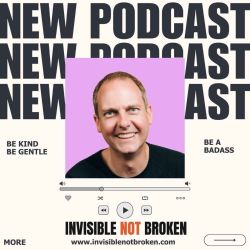
Vulnerability, Resiliency, and Advocacy with Tim Reitsma
47:06Monica Michelle is joined by consultant and podcast host Tim Reitma.Tim lives with Crohn's Disease.In this episode, Monica and Tim discuss: Tim’s resiliency through managing his Crohn’sThe importance of self-advocacy, especially in the workplace Tim’s podcast why he shares stories of those with invisible illness TIMESTAMPS00:47 - Tim's diagnosis 06:31 - How and why Tim applies self advocacy15:41 - Why Tim started his podcast22:42 - Invisible condition etiquette31:00 - What HR can do better for employees with invisible illness39:31 - Tools Tim uses to care for his Crohn’s outside the homeThe full transcript and all links mentioned can be found on the episode page on invisiblenotbroken.com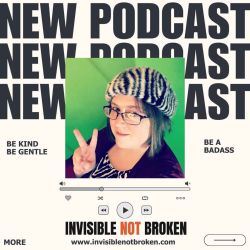
Tech and Disability: What VR Offers the Disabled Community with Sunny Ammerman
01:10:27Monica Michelle is joined by artist and disability advocate Sunny AmmermanSunny lives with Septo-optic dysplasia, panhypopituitarism, Optic Nerve Hypoplasia, and is missing a membrane in the brain called the "septum pellucidum".In this episode, Monica and Sunny discuss: Sunny’s complex disorders and how she copes with themEverything VR provides from accessible gaming, social platforms and the potential for better online education.Various VR/AR games and their gameplay Sunny’s VR support groupTIMESTAMPS00:45 - What VR/AR offers for chronically ill and disabled folks11:57 - Sunny’s conditions and how she copes with them17:55 - Features that make VR games accessible or inaccessible as well as different games and their play experiences37:13 - The social aspects of virtual gaming51:32 - What opportunities VR has for the future1:04:49 - Sunny’s VR support group The full transcript and all links mentioned can be found on the episode page on invisiblenotbroken.com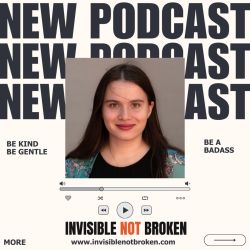
Reporting on Chronic Illness and Disability with Journalist Julia Metraux
39:16Monica Michelle is joined by Journalist Julia Metraux.Julia lives with vasculitis, mild to moderate hearing loss, and has experienced long COVID.In this episode, Monica and Julia discuss: Julia's diagnosis with vasculitis and how it influences her journalistic lensHow community impacts the mental health of those with chronic illnessHow Julia and Monica find positives and negatives in the internet spaces for chronically ill and disabled folksThe politics of how government, businesses, and celebrities influence the chronic illness community TIMESTAMPS00:32 - Julia's diagnostic journey07:02 - Julia’s work reporting on the online community of chronic illness 16:32 - The effect of Internet communities on chronically ill and disabled folks26:46 - How Julia’s illness impacts her work, both in what she writes about and how she manages her lifestyleThe full transcript and all links mentioned can be found on the episode page on invisiblenotbroken.com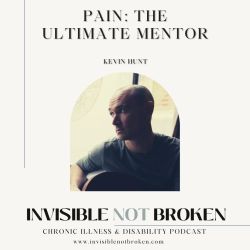
Author of “Pain: The Ultimate Mentor,” Physiotherapist Kevin Hunt
31:29Monica Michelle is joined by author & physiotherapist Kevin Hunt.Kevin lives with chronic pain.In this episode, Monica and Kevin discuss: Kevin’s philosophy of pain management as a physiotherapist who experiences chronic pain. The Hexagon Model, a life-management tool for focusing on what’s important to you.Kevin’s idea behind his new book.Using pain as a guide.TIMESTAMPS00:34 - Kevin’s work as a physiotherapist specializing in the experience of pain 06:44 - The Hexagon Model for managing your life’s needs14:00 - Putting aside the idea of a “quick fix”19:45 - Kevin’s personal experience with pain and how he uses it with patients28:44 - Kevin’s book, “Pain: The Ultimate Mentor”The full transcript and all links mentioned can be found on the episode page on invisiblenotbroken.com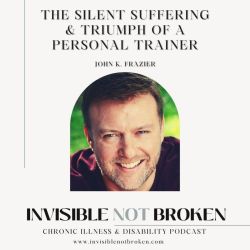
Author of “Through the Pain: The Silent Suffering & Triumph of a Personal Trainer”: John K. Frazier
28:35Monica Michelle is joined by author & personal trainer John K. Frazier.John lives with ankylosing spondylitis.In this episode, Monica and John discuss: John’s work as a physical trainer and authorChronic pain comparisonsPersonal triumphTIMESTAMPS00:50 - John’s business & diagnosis07:19 - Chronic pain olympics09:31 - Talking about & hiding a diagnosis15:09 - Personal triumph18:24 - Staying in the present23:29 - The superman complexThe full transcript and all links mentioned can be found on the episode page on invisiblenotbroken.com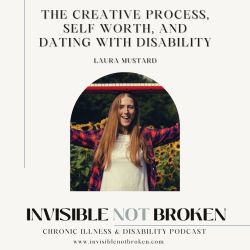
The Creative Process, Self Worth, and Dating with Disability: Laura Mustard
31:08Monica Michelle is joined by musician Laura Mustard.Laura lives with VATER syndrome.In this episode, Monica and Laura discuss: Laura’s inspiration for her upcoming musical EP.How Laura’s illness impacted her recent relationship & self-image.Laura’s creative process, new music, and social media pressure.TIMESTAMPS00:30 - Laura’s new EP / Monica’s recent COVID experience05:32 - Relationships with chronic illness11:20 - Image and self acceptance with disability15:32 - Laura’s creative process and current projects20:05 - Pursuing creativity despite social media attentionThe full transcript and all links mentioned can be found on the episode page on invisiblenotbroken.com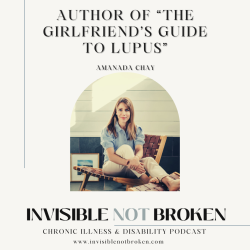
Author of “The Girlfriend’s Guide to Lupus”: Amanda Chay
30:43Monica Michelle is joined by author Amanda Chay.Amanda lives with Sjögren’s and Lupus.In this episode, Monica and Amanda discuss: Amanda’s book & diagnosisOutlooking on work & writingNavigating chronic illness with kids & familyTIMESTAMPS00:26 - Intro + The Girlfriend’s Guide to Lupus02:17 - Amanda’s diagnosis10:09 - Amanda’s outlook on writing17:11 - Navigating chronic illness with kids & family23:29 - Labels and roles26:24 - Flare reads & closing remarksThe full transcript and all links mentioned can be found on the episode page on invisiblenotbroken.com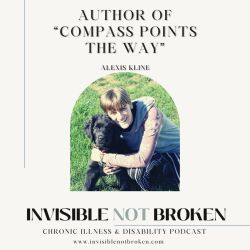
Author of “Compass Points the Way”: Alexis Kline
23:14Monica Michelle is joined by author Alexis Kline.Alexis lives with Dysautonomia.In this episode, Monica and Alexis discuss: Being a sick teenagerHaving an isolated diagnosisProductivity workflowsTIMESTAMPS00:28 - Alexis’s diagnosis & dog07:18 - Sick teenager road map10:00 - Alexis’s book & workflow16:25 - Having an isolated diagnosis20:50 - Wildlife photography, purchases The full transcript and all links mentioned can be found on the episode page on invisiblenotbroken.com
Author of “From the Sidelines to the Finish Line”: Emily Falcon
36:47Monica Michelle is joined by author Emily Falcon.Emily lives with ALCAPA.In this episode, Monica and Emily discuss: Growing up sickPost-surgery supportHaving a public bodySelf-motivation and adventuringTIMESTAMPS00:28 - Being a sick kid & Emily’s book title07:28 - Mortality10:16 - Portrayal of disability in media12:21 - Post-surgery support19:23 - Having a public body23:43 - Self-motivation29:46 - Emily’s tips for adventuresThe full transcript and all links mentioned can be found on the episode page on invisiblenotbroken.com